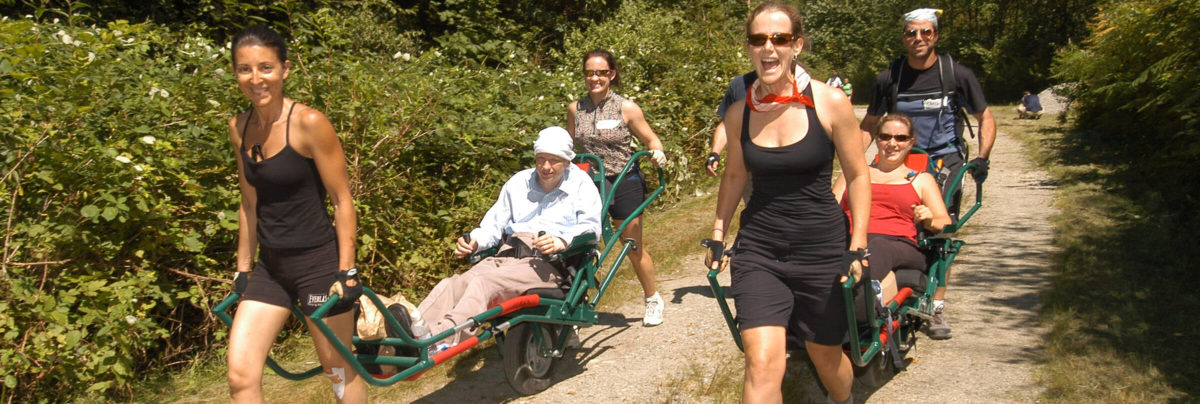Our founder, Sam Sullivan, wanted to rebuild his life following a high-level spinal cord injury. Sam broke his neck in a 1978 skiing accident, aged 19. He found himself tetraplegic, unable to dress or feed himself, let alone continue playing active sports or making music. Or so it seemed at the time.
Over the following few years, Sam sunk ever deeper into depression, feeling he’d never get a job or lead any kind of meaningful life. One despairing night in the early ‘80s he considered ending it all.
“I went through the motions of what it would be like to do that,” he recalls. “But it was so traumatic for me, it actually made me think ‘This is my life, what do I have, and what do I need?’ From that, I figured out what I wanted from life and what I could do.”
From this watershed moment Sam set out to redefine what he was capable of.
For a time he played wheelchair rugby – back then it was called murder ball – but his disability was a barrier even in this accessible sport.
“I just could not compete with the people with arm function,” he said. “What I could do was go up to these great players and get right in their spokes, so they’d be basically tied up in the corner, and our guys could go and score.
Each person gave me a different lesson, but what seemed common to all was that they expected more from their life.
“I could not catch or hold the ball, but I figured the thing I could do, so I could keep on in the team, was go out and raise money.”
He took a similar approach to finding employment, approaching Doug Mowat, a legendary Vancouver figure – a tetraplegic himself – who had helped found the B.C. Paraplegic Association in 1957 (subsequently re-named Spinal Cord Injury BC).
Sam offered to produce newsletter stories about people with disabilities “that were in control of their lives” – so he could understand how they achieved success.
“I’d assumed these people started out with money or advantages but was shocked to find none had. Each person gave me a different lesson, but what seemed common to all was that they expected more from their life.”
“So far I’d learned not to expect too much so I wouldn’t be disappointed. The hardest thing for me was to learn to tell myself a different story.”
Armed with “$100 per month and a business card,” not to mention a renewed self-belief, Sam entered a new period in his life. He describes this as enlightened self-interest, finding leisure pursuits he’d like to follow, but soon realizing the real joy lay in turning these into initiatives that improve the quality of life of other people with disabilities.
Over an intensive 20-year period, Sam built a succession of non-profit groups offering opportunities to people with physical disabilities in Vancouver and across Canada. As much as anything, he formed the groups because of the years of depression – to send a message of hope to people in despair.
A Dream is Realized
Today, Tetra Society of North America helps people with physical disabilities to renegotiate the physical environment around them. British Columbia Mobility Opportunities Society and the Disabled Sailing Association make the outdoors accessible. Vancouver Adapted Music Society provides an accessible studio for recording music and cultivating the talent of its roster of musicians. ConnecTra brings people with disabilities together to improve awareness about community resources. The Disabled Independent Gardeners Association makes accessible the experience of gardening. The Disability Foundation was created to help raise funds so the various societies would continue to provide meaningful experiences.
Sam found that his greatest strength was in bringing people together to create self-maintaining groups: the people with disabilities who want to do more, and volunteers and other supporters who want to make a difference.
“I curated relationships and started to raise money, and set out to find allies,” explained Sam. “It was totally different to thinking about marches and protests and sit-ins. We had to be conscious of people that had resources, and what they would want to support. There are people in society that can identify with the plight of people with disabilities.”
Reflecting on his journey and the formation of these societies, Sam affirms what he’s learned along the way:
“We have to improve our own lives from within, by finding interests and making connections. Accessible outdoor activities might sound like leisure, but in reality they help people who have experienced despair to move on and find value in their lives, realizing their own potential.”
Sam Sullivan
And that’s what the Disability Foundation does to this day – providing services and lifestyle activities that provide opportunities for people with physical disabilities to empower their individual journey.
As for Sam, he went on to become mayor of Vancouver in 2005, subsequently founded the Global Civic Policy Society, and is currently an MLA, but really, that’s another story.
